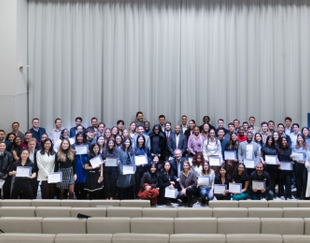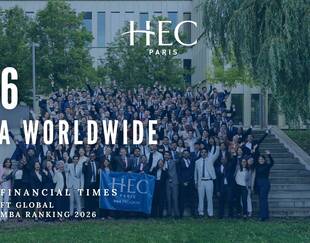Finance
Le département Finance mène des recherches dans les domaines principaux de la finance, tels que l’évaluation des actifs, le financement des entreprises, la microstructure des marchés, l’intermédiation et la régulation financière.
Le département compte 30 professeurs et gère un programme de doctorat qui connaît un grand succès, avec un excellent taux de placement, et reçoit des professeurs visitants de grandes universités américaines et européennes.
Il organise chaque année environ 30 séminaires de recherche menés par des personnalités éminentes du monde universitaire américain ou européen.
Le département assure l’enseignement de la spécialisation Finance au sein du Master in International Finance, de l'Executive MSc in Finance, la spécialisation Finance du MBA Finance Specialization, de l'Executive MSc in Finance et des cours de finance au sein du Master in Management et de l'Executive MBA.
Événements à venir et passés
11-12 décember 2025: HEC Paris Entrepreneurship Workshop
27-29 août 2025: ERC Summer School and PhD Workshop
6 mai 2025: Top Finance Graduate Award at HEC Paris 2025
10-11 avril 2025: Adam Smith Workshops in Asset Pricing & Corporate Finance
17-18 décembre 2024: HEC-HKUST Sustainable Finance Workshop 2024 | HEC Paris
12-13 décembre 2024: HEC Paris Entrepreneurship Workshop
29-30 août 2024: 8th HEC PARIS Finance PhD Workshop (Daniel Schmidt)
27-28 mai 2024: HEC Paris-Natixis Banking Conference 2024: "Banking in the Age of Challenges" (Jean Edouard Colliard, Ciaran Rogers, Guillaume Vuillemey and Quirin Fleckenstein)
15 mai 2024: 2nd Conference of the Top Finance Graduate Award at HEC Paris (Jean Edouard Colliard and Augustin Landier)

PhD Foundation Awards 2025
Congratulations to Dr. Madhulika Kaul (D.23) and Yurii Handziuk for winning the 2024 HEC Foundation Prizes in recognition of their outstanding doctoral research and academic impact.
Lire la suite
Nos adieux à Marie Elizabeth Sushka : Chercheuse, mentor et amie d'HEC
C'est avec une profonde tristesse que nous avons appris que Marie Elizabeth Sushka, professeure de finance à la W. P. Carey School of Business de l'Arizona State University, est décédée le samedi 5 avril 2025.
Lire la suite
Jessica Jeffers' Research Informs New FTC Non-Compete Policy: A Push for Enhanced Labor Mobility and Innovation
In January 2023, the US Federal Trade Commission (FTC) proposed to ban non-compete clause rules, a move inspired by California's success, where the absence of such clauses has contributed to Silicon Valley's growth. As part of the decision-making process, the FTC reviewed...
Lire la suite
Top Finance Graduate Award 2024: Celebrating the Future of Finance
For the second year running, HEC Paris hosted the Top Finance Graduate Award 2024, a celebration of innovation and academic excellence organized by professors Jean-Edouard Colliard and Augustin Landier. The daylong event showcased groundbreaking research by six of the most...
Lire la suite
Pas d’excellence sans impact : découvrez les meilleurs travaux 2023 de la faculté d’HEC
Le 4 mars dernier, pour sa 47ème édition, la remise du Prix de la Fondation HEC a consacré les travaux d’excellence des professeurs chercheurs d’HEC Paris. De la finance, au marketing, à la stratégie d’entreprise, aux systèmes d’informations, la production de connaissances...
Lire la suite
Inquire Europe récompense une recherche d'Irina Zviadadze
Lors de son séminaire d'automne 2023, Inquire Europe a attribué le premier prix à un papier co-écrit par Irina Zviadadze, professeur associée de finance à HEC Paris.
Lire la suite
HEC accélère son recrutement d'enseignants-chercheurs de renom
HEC Paris poursuit sa campagne de recrutement d’enseignants-chercheurs de renommée mondiale avec l’arrivée de 14 nouveaux universitaires pour grossir ses rangs. L’école ambitionne depuis longtemps de devenir l’une des principales plateformes de recherche au monde. Le corps...
Lire la suite
Irina Zviadadze reçoit le prix du meilleur jeune chercheur en finance et assurance 2023
Irina Zviadadze, professeure associée en finance à HEC Paris et membre du GREGHEC (le laboratoire de recherche CNRS-HEC Paris), est la co-lauréate du prix « Meilleur Jeune Chercheur en Finance et Assurance » 2023, parrainé par la Fondation SCOR pour la Science.
Lire la suite
HEC Paris PhD Candidate Maxime Bonelli, wins the EFA Doctoral Tutorial Prize 2022
Congratulations Maxime! The European Finance Association (EFA) DT Co-Chairs awards the best paper presented at the 2022 EFA Doctoral Tutorial to Maxime Bonelli, HEC PhD in Finance.
Lire la suite
AQR Top Finance Graduate Award recognizes HEC PhD Noémie Pinardon-Touati amongst the most promising finance PhD graduates in 2022
Congratulations to Noémie Pinardon-Touati, one of the 6 winners of the 2022 AQR (Applied Quantitative Research) Top Finance Graduate Award. This prestigious prize rewards the six best students in finance in the world selected by a jury of absolutely top academics in the...
Lire la suite
Jean-Édouard Colliard reçoit le prix du meilleur jeune chercheur en finance et assurance 2022
Jean-Édouard Colliard, professeur associé en finance à HEC Paris et co-titulaire de la chaire Analytics for Future Banking (HEC Paris — Natixis — Polytechnique), est le lauréat du prix « Meilleur Jeune Chercheur en Finance et Assurance » 2022, parrainé par la Fondation...
Lire la suite
Two HEC Professors Win Prestigious “Case Method Oscars” in 2022
For the first time in its 32-year history, the Case Centre, a leading independent case-publishing platform, has rewarded not one, but two, HEC academics in the same year for their outstanding case work in 2021. Professors Rodolphe Durand and Denis Gromb were recognized in...
Lire la suite
Research by Jean-Edouard Colliard and Thierry Foucault Published in the Journal of Finance
The Journal of Finance, one of the top journals in financial economics, just published the paper “ Inventory Management, Dealers' Connections, and Prices in Over-the-Counter Markets” by HEC Paris finance professors Jean-Edouard Colliard and Thierry Foucault (together with...
Lire la suite
Thierry Foucault nommé co-directeur de la rédaction du JFQA
Thierry Foucault, Professeur de finance titulaire d’une chaire de la Fondation HEC, a été nommé co-directeur de la rédaction du Journal of Financial and Quantitative Analysis ( JFQA) en septembre dernier.
Lire la suite
Le cas de Denis Gromb sur le Private Equity remporte le Prix AFFi-CCMP 2021
Le cas “Private Equity et Infrastructure : Antin crée une TowerCo” écrit par Denis Gromb a remporté le Prix 2021 AFFi*-CCMP récompensant le meilleur cas en finance de l’année. Le cas est l’un des projets issus de la chaire organisée par ANTIN I.P. et HEC Paris, dédiée au...
Lire la suite
Des recherches de Daniel Schmidt acceptées par « The Review of Asset Pricing Studies »
L’article de recherche intitulé «Fundamental Arbitrage under the Microscope: Evidence from Detailed Hedge Fund Transaction Data» (Arbitrage fondamental au microscope: preuves tirées de données détaillées sur les transactions de hedge funds) du professeur associé en finance...
Lire la suite
L’université de Zurich récompense Bruno Biais d’un Doctorat Honoris Causa
Bruno Biais, professeur de finance à HEC Paris, a reçu un doctorat Honoris Causa de l'Université de Zurich, en reconnaissance de ses contributions fondamentales à la finance et à l'économie.
Lire la suite
Les travaux de Thierry Foucault sur l'IA et la finance remportent une bourse du Conseil Européen de la Recherche
Thierry Foucault, professeur de finance à HEC Paris et au GREGHEC (CNRS/HEC), et co-directeur scientifique du centre Hi! PARIS*, est l'un des 209 nouveaux bénéficiaires de l' Advanced Grant du Conseil européen de la recherche. Cette bourse lui permet de poursuivre son...
Lire la suite
Des recherches sur la crypto-monnaie par Ioanid Rosu publiées dans Management Science
Le département Finance d’HEC Paris est heureux d’annoncer que le professeur associé Ioanid Rosu a publié un article de recherche intitulé « Evolution of Shares in a Proof-of-Stake Cryptocurrency » dans Management Science, l’une des plus prestigieuses revues académiques de...
Lire la suite
Johan Hombert lauréat d’une bourse du Conseil européen de la recherche
Johan Hombert, professeur de finance à HEC Paris, reçoit une bourse « Consolidator » du Conseil européen de la recherche, faisant d’HEC Paris le récipiendaire de deux bourses CER en 2020, et de trois de ces bourses au total.
Lire la suite
« The Review of Financial Studies » publie une recherche sur l’immobilier de Christophe Spaenjers
Le département Finance d’HEC Paris se réjouit d’annoncer que l’article de recherche de Christophe Spaenjers sur la rentabilité de l’immobilier a été accepté pour publication par The Review of Financial Studies, l’une des trois principales revues de finance au monde. Sa...
Lire la suite
La "Review of Financial Studies" publie les dernières recherches d’Irina Zviadadze
Le département de Finance d'HEC Paris est heureux d’annoncer que les recherches sur le compromis entre risque et rendement d’ Irina Zviadadze, professeure associée de finance, sont à paraître dans la Review of Financial Studies, l'une des trois principales revues...
Lire la suite
Un professeur de finance à HEC Paris crée un blog pour donner du sens aux marchés financiers
Le professeur Johan Hombert a créé un blog en anglais sur la finance pour garder le contact avec ses étudiants d'HEC Paris, et les aider à comprendre la crise du Covid-19, pendant et après le confinement en France. Le blog s’attache ainsi à répondre à une grande variété de...
Lire la suite
La doctorante Huan Tang remporte le « AQR Top Finance Graduate Award » 2020
Le département Finance d'HEC Paris est fier d'annoncer que la doctorante Huan Tang est l'une des six lauréates de l’AQR Top Finance Graduate Award 2020.
Lire la suite
L'assurance chômage peut stimuler l'activité entrepreneuriale, selon de nouvelles recherches
Comment encourager le dynamisme des entreprises alors que nous sortons à peine de l’épidémie de Covid-19 ? De nouvelles recherches montrent qu'une assurance chômage bien conçue peut être un élément essentiel. Johan Hombert, professeur de finance à HEC Paris, a publié au...
Lire la suite
Bruno Biais reçoit une bourse "Advanced Grant" du Conseil européen de la recherche
Début 2020, le Conseil européen de la recherche a décidé de consacrer 450 millions d'euros à la recherche à long terme en Europe, car "l'avenir de l'Europe dépend de la science et de la recherche" , comme l'a rappelé Mariya Gabriel, commissaire européenne chargée de l...
Lire la suite
HEC Paris - Société Générale : la chaire Energie et Finance renouvelée
HEC Paris et la Société Générale ont renouvelé leur partenariat autour de la Chaire Energie et Finance, fondée en 2005. La cérémonie organisée à cette occasion le 15 octobre était suivie d’une conférence sur les éléments-clés pour mener la transition énergétique.
Lire la suite
Comprendre la finance avec une bande dessinée
Ce 6 septembre paraîtra « Introduction à la finance » (éd. Dupuis), un hors-série de « Largo Winch », écrit par Olivier Bossard, professeur affilié à HEC Paris et directeur exécutif du MSc Finance. Créé par Jean Van Hamme, le personnage de Largo Winch est le héros de...
Lire la suite
4 Nations Cup : une compétition pour les jeunes chercheurs les plus prometteurs en finance
“ 4 Nations Cup” est une compétition internationale destinée aux jeunes chercheurs en finance, qui présentent à cette occasion leurs recherches en cours. Représentant quatre pays, les concurrents rivalisent pour le soutien du public qui vote à la fin de la journée pour...
Lire la suite
Economie spatiale : un nouveau partenariat prend son envol
HEC Paris, ArianeGroup et l'Agence Spatiale Européenne (ESA) viennent de signer un partenariat d’une durée de trois ans. L’objectif : mettre en place une chaire conjointe destinée à étudier les tendances et opportunités de long terme en matière d'économie spatiale. Les...
Lire la suite
HEC Data Day 2019 : un foisonnement d’initiatives
Malgré d’importantes chutes de neige ce jour-là, une centaine de personnes (chercheurs, étudiants, représentants d'entreprises et sponsors) sont venues participer le 22 janvier au deuxième « Data Day » organisé sur le campus d’HEC, une conférence d’envergure consacrée à l...
Lire la suite
HEC Paris accueille de nouveaux chercheurs et professeurs
Avec l’arrivée de 9 nouvelles recrues au début de cette année académique 2018-2019, HEC compte désormais 118 chercheurs. A l’occasion du Faculty Day organisé le 27 septembre dernier, Peter Todd, Directeur Général d’HEC, et Jacques Olivier, Doyen de la Faculté et de la...
Lire la suite
L'investissement à impact : passer des promesses aux actes
Le Centre Society & Organizations (S&O) et l’ European Venture Philanthropy Association (EPVA) ont rejoint l’association Action Tank Entreprise et Pauvreté pour une plénière axée sur l’investissement à impact. Cette soirée de débats et d’échanges a eu lieu le 10 octobre...
Lire la suite
Un acteur financier de référence crée une nouvelle chaire à HEC
HEC Paris et ODDO BHF viennent de créer une chaire d'enseignement en analyse financière, avec l'objectif de renforcer les formations aux méthodologies d’analyse financière des entreprises proposées par l'école. Le premier titulaire sera le professeur associé en finance...
Lire la suite
#Finance : quatre questions à Augustin Landier
Suite au débat HEC Paris – Viavoice sur l’industrie financière et les nouvelles technologies du 10 avril, Augustin Landier, professeur à HEC, a partagé avec nous sa vision sur le « gap générationnel » entre les managers jeunes et plus expérimentés, la nature...
Lire la suite
HEC Paris et l’Agence Spatiale Européenne lancent l’ESA_LAB@HEC Paris, une initiative conjointe pour explorer l’espace
L’Agence Spatiale Européenne (ESA) et HEC Paris ont signé un accord conjoint centré sur la création d’un laboratoire de recherche baptisé ESA_LAB@HEC Paris.
Lire la suite
Unilend pionnier du financement participatif invité de la FinTech Talent Fair
Sabine Fillias, DG déléguée d’Unilend « nous créons l’Euronext des TPE-PME »
Lire la suite
Succès pour la 3ème édition de la Fintech Talent Fair
Fintech : ce mot vous dit quelque chose ? Selon Philippe Limantour, directeur de l’Innovation chez EY, les fintechs sont des organisations qui combinent des business models innovants avec les nouvelles technologies pour améliorer et “disrupter” les services financiers...
Lire la suite
Fintech – Que cache réellement le phénomène ?
La Fintech semble omniprésente ces temps-ci. Mais que savons-nous exactement du secteur ? Dans notre dernière enquête Executive Horizons, 65 % des participants ont évalué à 3 sur 5 seulement leur connaissance de la technologie financière. Comment la Fintech est-elle en...
Lire la suiteProfesseurs du département
PhD du département


CONTACT

Bureau : Bâtiment W2 – 012 Bis
Bureau : Bâtiment W2 – 017 Bis














































